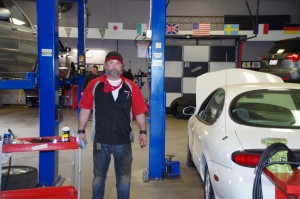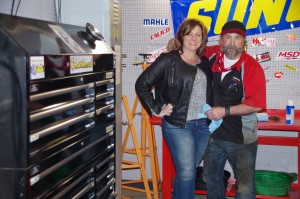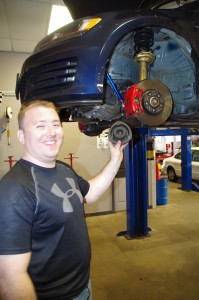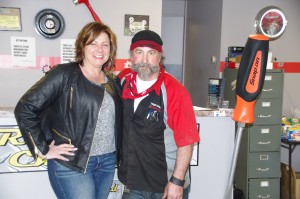
(Photo: Michael Bilow)
Ron Long as a 19 year old in 1982 came up with the idea for a customer-friendly car repair garage that would make available professional-grade tools, lifts and state-of-the-art diagnostic equipment to do-it-yourself mechanics, but it wasn’t until 2015 that he and his wife Cheryl opened Gearhead Systems International in Warwick.
“I was in the Navy and they had a hobby shop on base where you could work on your own car, and the guy running it was a miserable old retired Navy Chief who was mean, and I drove a Triumph back then so I lived in the place – it broke down all the time. One day I asked him, ‘Why are you so effin mean to me? I’m a good customer here. I spend a lot of money here. You’re miserable to everybody, You’re running this place wrong.’ So I said, when I grow up, and I’m going to do something when I get older, I’m going to do this… So everywhere I went overseas, on different napkins and different pieces of paper, I made my notes of what I wanted to do differently. The only thing that’s changed is my idea of the [pictures of] cars that are on the wall: it was a Fiero, it was a 308GT, it was a fastback Mustang, it was ‘80s cars, Camaros. That’s the only thing that changed, the idea is still there, but the pictures changed, got updated,” Ron said. “So when I put this together and it all happened, I had notes on bar napkins in different places overseas. I made notes of another idea I would have and I just kept them, and when I put it together I still had all those notes for the last 30 years…. Always wanted to do something for the last 35 years, absolutely, but it had to be when the timing was right because I had a lot of stuff going on, but this is what, from that argument with that guy, that’s what started it.”
For the basic rate of $20 per hour, a customer gets “a fully-equipped bay with a lift” and “use of all tools, specialty tools, diagnostic equipment and shop machinery, with the exception of vehicle software downloads and welding equipment/supplies, which carry additional charges.” Disposal of conventional hazardous waste, such as used engine oil, is also included. Even snacks, including bottled water, cookies and candy, are available for a dollar or two.

(Photo: Michael Bilow)
Ron and Cheryl have no employees and run the shop themselves, so they’re always available to provide advice. Do they find it grueling to be there seven days each week? “No, I love it,” Ron said. “I have enough days off throughout the year that it’s fine. If I need to take a day off, I’ll take it.” Business is very good especially on weekends, Ron said. “Usually the bays are packed from Friday morning, 8 o’clock, through Sunday afternoon.”
Did Cheryl require convincing to buy into Ron’s dream business plan? “I think it’s a phenomenal idea. I thought it was right from– I wasn’t against it, I definitely thought this was a great idea. I immediately was on board,” she said. Both Ron and Cheryl grew up in Warwick. They met, Ron said, “When I had my [car] dealership, I used to go in the bank every day. She worked at Citizen’s Bank and she was always my business teller and we became friendly.” Cheryl said, “I have become a car person over the years. I’m not hands-on, I don’t touch anything, but I can diagnose.” Ron agreed, “She knows this business very well.”
Snap-On, the tool supplier, uses the facility for seminars aimed at professional mechanics, but Ron wants to expand to wider audiences. “We’re starting to put together seminars. We want to do one for first-time drivers: teach a kid how to change a flat tire, where to check the oil… We have female mechanics who want to teach seminars to women: this is how you do a brake job, this is how you do an oil change, all taught by a female mechanic,” Ron said. Of 740 customers who work out of the shop, he estimated that “a solid dozen” are female, and an additional 20 or so women work on cars together with their husbands or boyfriends. “Not a big percentage, but they’re there, and they’re good, and they’re not afraid to get dirty.”
The mix of customers is varied, ranging from professional mechanics working on side jobs to hobbyists. A number of Uber drivers are looking to save money by doing their own routine maintenance for taxicab-like rough service conditions, saving money by changing their oil themselves twice each month. “We actually have two gentlemen that come from [Westchester County] New York and they have a blog for their BMW, and they come in here and spend the whole weekend here. They book the whole weekend, and they blog everything that they do and they post it on their forum,” Cheryl said. Although shared car repair garages are found in other parts of the country, primarily in the Midwest and the South, Gearhead in Warwick is the closest from anywhere along the densely populous corridor between New York City and Boston.
One customer who came into the shop was Kelsey, a 21 year old whose day job is as an automotive technician at Flood Ford while he trains to be a firefighter. He was looking for “extra cash, extra work and extra experience,” he said. “I’ve been a tech for around five years. I started off at Balise Toyota of Warwick. Loved the place, great guys. We had a bunch of lifts, but when I first started I didn’t have my own lift, so I had to come to a place that supplied all the lifts, supplied all the tools and supplied everything that I need. I walked in here with my mother’s car, which is a [Toyota] RAV4… and he said, ‘Hey, I’ll set you up on that lift right there,’ and I just went to work. I did a four-around brake job and an oil change, nothing major, something tiny. So I’ve been coming here ever since. I did a brake job last week, I’m doing four tires this week, and I’m probably doing a charcoal canister next week,” Kelsey said. “I have a lot of friends that are in college so I try to help out everyone that I can that are in college and can’t afford a full-time technician, which I understand: You’re in college, you’re a young kid. So if one of my friends or a buddy of my friends calls me up, I tell them, ‘Hey, tell me what you have, I’ll let you know if I can do it, and I’ll let you know how much I could do it for.’” Kelsey’s friends can save quite a lot of money. “I just did that brake job. Usually a brake job at a dealership costs 300 bucks. She got it done for 150 for pads and rotors, and 50 bucks for me.”
He came in to do work for Tim, whose truck needed four new tires. “A couple of years ago we found this place and it was like, ‘Yeah, you know what, we’ll check this out.’ My uncle came here to do his brakes and this place is very nice to do it. They have everything you need here and it’s pretty cheap, you can’t beat it,” Tim said. “I was doing some price shopping and all the other places I decided to check out, it was like 470-something dollars, plus 100-some-odd dollars to get them balanced and mounted. Just buying the tires and coming here, I saved myself 120-130 bucks,” after paying Kelsey.

(Photo: Michael Bilow)
Nick Wadlinger is a regular customer who was in working on his 2015 Volkswagen GTI, helped by his friend, former co-worker, and fellow VW enthusiast William Bennett. Wadlinger’s day job is in software working on data analytics and Bennett’s is doing model risk management for a large bank.
Wadlinger said, “I’ve got Eibach springs, KONI FSD shocks, it’s lowered about an inch, Continental ExtremeContact tires. I’ve got a software tune on it that increases the horsepower by about 90. Stock turbo, but that will be going out eventually.” Wadlinger plans to join Bennett in autocross racing, a form of competition that prizes driver skill and safe handling, competing against the clock with only one car on the course at a time, at Fort Devens in New Hampshire.
“I kind of got lost on my way to engineering school. By the time I figured out I should have been an engineer it was too late, so now I just do it in my spare time… I’ve always been a car nut. My first car was a Honda CVCC, ‘89, standard, no right rearview mirror – it didn’t come with one, not that it fell off, just never came with one,” Wadlinger said. “It was the same car the CR-X was derived from, same chassis, so although it only had 70 horsepower on a good day, it was actually a lot of fun to drive.”
Wadlinger estimates that he brings his car into the shop about every other week and has even come in during lunch breaks from work. “I do all my own maintenance, I do my own oil changes, I do them at a much smaller interval than the factory recommends, obviously… Today I am removing strut mounts. I did the suspension three weeks ago, and I had gotten heavy-duty aftermarket strut mounts and they’re very noisy. I think they’re either defective or just poorly designed, so I’m taking them out and putting in a revised version of a similar product from a different company.”
Although Wadlinger lives in the East Bay, Bennett comes down from close to Boston and jokingly described his background working on cars as “trial and error.” Wadlinger explained the attraction: “It’s $20 an hour, which is incredibly cheap… I mean, we come here and just clean some stuff under the car for kicks because it’s what we enjoy and it’s a hell of a lot cheaper than, you know, golfing.” Both men estimated that they had been to Gearhead 30-40 times each.
More seriously, though, Wadlinger prefers working on his own car. “I’ve had bad experiences even with dealers, even with good dealers that I like. I got aftermarket wheels and they used an impact wrench that was too big to fit in the hole and scratched the entire hole. I was like, ‘Hey, what’s that?’ and they were like, ‘Oh, uh, no, that was there.’ Yeah, okay, sure. While I can’t do it as fast as them, and I don’t have the experience they do, I can follow the instructions and do it slowly, correctly. And that way I know I’m not breaking anything, and if I do break anything it’s my own fault, plus it’s a learning experience.”
For a while, Bennett said, he and his wife went down to one car while he commuted to work by train, “so I went a long stretch without having a toy.” On his wife’s car, “the blower motor seems to be going out, so her and I are going to swap that out together. We’ve done the brakes ourselves, her and I… she enjoys it, actually.”

(Photo: Michael Bilow)
“I usually pick a guy’s brain when he’s coming in. ‘What are you trying to do? Have you ever done it before?’” Ron said. If the response is that he hasn’t done it before, “I’ll tell him, ‘That’s a little danger for the job, so why don’t you think about it?’ Sometimes he’ll bring an experienced mechanic to help him. I won’t let anybody come in here and do something they’ve never done before that’s dangerous. I don’t want anyone getting hit in the face with a spring or something like that.” So far, Ron said, they have a near-perfect safety record. “The biggest injury someone’s had is they maybe cut their finger and needed a Band-Aid or something like that. I drive all the cars in, I lift them up, I lower them down, I remove that from the equation.”
“The biggest headache you have is if someone orders parts on-line and they’re wrong, now it’s an annoyance, so I usually send them to the store to get the right ones or have them delivered here, and they’ve got to return” the unsuitable ones. If people get in over their heads, Ron can take over the repair job at shop labor rates. “I’ll have a guy who comes in and let’s say he goes to do a job and he can’t get the parts for four days. We’ll put the car on casters, we’ll roll it out back, and we’ll give him free storage. The part comes in, I’ll have him ship it right here, and we’ll push the car back in when he comes. We’re very, very customer-friendly. If a guy wants to do storage for a [long-term] project car we’ll store it for him, X amount of dollars a month, and then when he works on it, he comes in and he pays for the day. But if a guy’s going to be waiting for a part for 4-5 days, no problem.”
“Doing all the bull-work as a young mechanic is a lot different than assisting people and having the knowledge to help them do the job… I get a lot of young mechanics that come in here. They do things differently than me, but they grew up in a tech society. I had notes and books with pictures of pieces of engines that still had grease on them. Now they have videos on YouTube. Kids are a lot smarter now. I learn a lot of stuff from these young kids, the way they do things – they work smarter, not harder. We worked hard, we busted our ass back then, like bull-workers. They know now: I’m going to research it first and I’m going to do it without even getting my hands dirty. The biggest thing is the rubber gloves everybody uses now, I wish I knew that back then,” Ron laughed. “All these young mechanics, 20-21 years old, very talented. So I learned a lot of new things from them and they learned a lot of primitive things from me of how, when it comes time to really do it, like putting a clutch in and you’ve got to get the tranny in, sometimes it takes the old timer to come and bull-work it in.”
“When they get into a jam, they always come to you and you get them out of it,” Cheryl said to Ron. “That’s from age and experience,” Ron agreed. “I get a lot of kids trying to do something and I say, ‘Why don’t you try this?’ or ‘Let’s do this.’ That’s from having it really happen to you on a Sunday afternoon where there’s no stores open and you’ve got to make that car work, and your customer needs a car – that’s when you’re a mechanic. A mechanic fixes something, they don’t just replace a part. That’s where a lot of my experience is.”
Gearhead Systems International, 250 Oakland Beach Ave, Warwick. Web: gearheadsystemsinternational.com/ E-mail: info@gearheadsystemsinternational.com Tel: 401-739-0090
